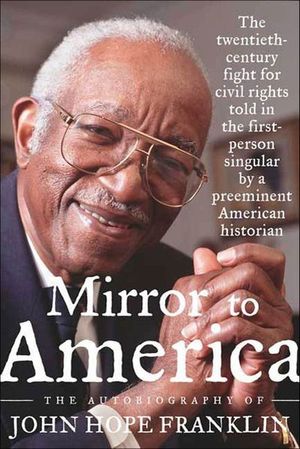Mirror to America
Published by Farrar, Straus and Giroux
The legendary man recounts his journey from a childhood in Oklahoma to an Presidential Medal of Honor–winning African American historian.
“An astonishing beautiful, deeply intelligent record of an extraordinary life. Required reading lest we forget what is possible in a race-based society.” —Toni Morrison, winner of the 1993 Nobel Prize in Literature
“John Hope Franklin’s story is the stuff of American legend.” —The Washington Post Book World
From his effort in 1954 to hand President Franklin D. Roosevelt a petition calling for action in response to the Cordie Cheek lynching to his 1997 appointment by President Bill Clinton to head the President’s initiative on Race, and continuing to the present, celebrated scholar and bestselling author John Hope Franklin has influenced the nation’s racial conscience with determination and dignity. Whether aiding Thurgood Marshall’s preparation for arguing against Robert Bork’s nomination to the Supreme Court in 1987, Franklin has pushed the national conversation on race toward humanity and equality, a lifelong effort that earned him the Presidential Medal of Freedom, the nation’s highest civilian honor, in 1995. Intimate, at times revelatory, Mirror to America chronicles Franklin’s life and this nation’s racial transformation in the twentieth century, and is a powerful reminder of the extent to which the problem of America remains the problem of color.
“John Hope Franklin is a true role model. He embodies the native optimism, i.e., that one can go from slavery to freedom, from ignorance to intelligence, can experience cruelty, yet manifest kindness. In Mirror to America, each citizen can see herself and himself, reflected in the life of this great American.” —Maya Angelou
“Franklin comes across on these pages as the rarest sort of patriotic American—one who believes this nation should actually live up to its lofty ideals of justice and equality for all. That Franklin has maintained his lifelong patience and gentle sense of humor in the face of legal and extralegal racism is a true testament to the man.” —San Francisco Chronicle
“[Franklin] weaves enthralling tales tha provide both an intimate glimpse of Franklin the man and a critical look at the times in which he lived.” —The Charlotte Observer
BUY NOW FROM
COMMUNITY REVIEWS

